The Ultimate Guide to ERP Development: Stages, Benefits, and Estimated Price
Updated 31 Aug 2023
13 Min
3930 Views
Once, there comes a moment when entrepreneurs can’t handle all business-related issues on their own. Supply chain, accounting, risk management, and other operations require high-level management and deep expertise in the niche. This fact creates a demand for experienced personnel and new working places.
However, enterprise resource planning software lets you automate most of these processes with minimal human impact. In this post, we’ll discuss the concept of ERP software, the ERP software development process, and explain its benefits.
What Is ERP Software Development
First off, we need to clear up the meaning of enterprise resource planning (ERP). ERP software handles the management of main business processes in real-time. ERP applications collect, store, manage and interpret information from various business activities. In some sense, ERP software is a mediator between all core business processes.
ERP is modular software and it stores information gathered from different departments in a central database. That means employees from a specific department can access information that concerns only their department. On the other hand, ERP software specialists that manage all business processes can access the information from every department.
Benefits of ERP Software Development
Custom ERP software is hard to design, but with an experienced software development company, the result will exceed your expectations.
Here are some of the ERP application development benefits:
- Isolated modules. With custom ERP software development, you can create different modules designed for your company's specific department. Employees from each department won’t be confused with a ton of features and information used by other departments. Besides, the encapsulation of processes grants safety and mitigates the data leakage risks.
- Easy-to-learn. It’s easier to explain something designed exclusively for your company than for a mass market. With proper documentation from developers, the employee training process will go faster.
- Easy-to-maintain. When some bugs appear in third-party software, you contact a support team to resolve the issue. With custom software, your developers know all the system’s peculiarities and can fix bugs in no time.
- Flexibility. The main drawback of third-party software is that you need to adapt to it. Even though the market offers a wide range of solutions, they can’t fit every company’s needs. Your business is unique, and only a custom solution can solve all your problems. With ERP software development, the product is designed specifically for your company, so you don’t have to restructure it for a third-party application.
Drawbacks of ERP Software Development
Even though ERP system development is obviously a great investment, everything has its price.
Here are the main pitfalls of ERP software development:
- Price. It’s what keeps the majority of entrepreneurs away from ERP software development. It’s evident that a large project that covers the whole company costs a lot, and it’s often cheaper to stick to third-party solutions that use a subscription model. However, this economy is doubtful in the long run. With ERP software development, you’re paying not only for an application but also for flexibility and convenience. That often leads to reduction of operating expenses.
- Development time. ERP application development requires as much time as finances. Software engineers need time for creating business-logic, drawing up the design, and testing each layer. But keep in mind that you have to spend some time training employees how to use a software from vendors.
- Finding a partner. Last but not least is a tech partner. The process of hiring a reliable software development partner may take months. So, if you have strict time frames, take care of the team firstly.
Third-Party vs. Custom-Made Solutions
When searching for ERP software, entrepreneurs have two different options. The first one is to use third-party software distributed via different subscription plans. The second one is to create a custom solution for the company. Both approaches have some flaws and advantages that we’ve highlighted in this section.
Third-Party Solutions
Software as a service providers offer a number of ERP solutions that can be deployed right after the initial payment. Turn-key solutions like Acumatica, Sage Intacct, and SAP Business One are a good fit for small and medium-sized businesses. At the same time, extensive systems like Oracle NetSuite, SAP S/4 HANA, and Microsoft Dynamics are designed for large businesses and enterprises.
Even though some of these systems, like SAP S/4 HANA, let users create custom add-ons to the core software, they still lack flexibility. Additionally, manipulations with source code and API integrations mean that you should have developers at your side.
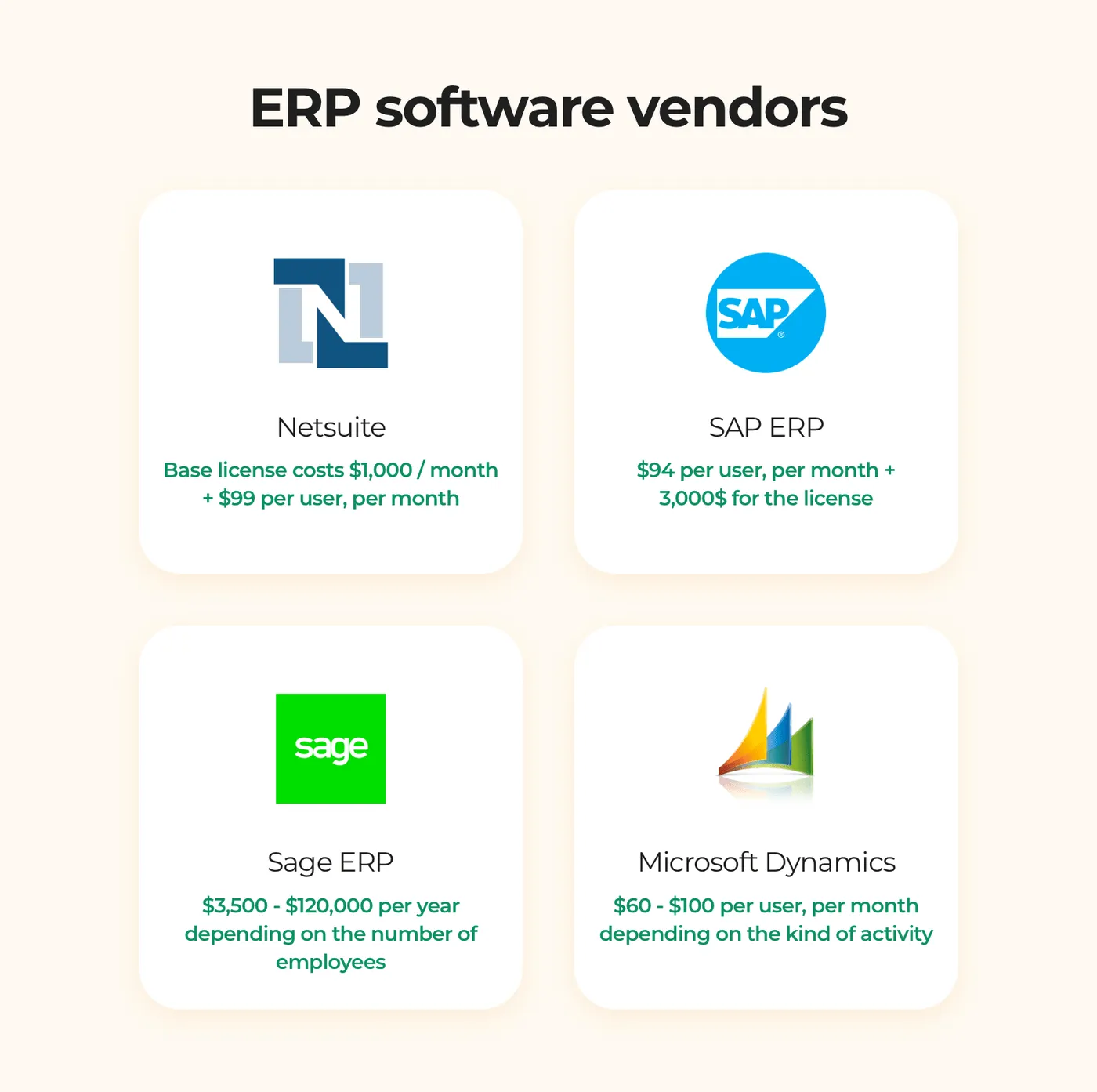
Popular ERP software vendors
Among all the pitfalls, training difficulty is the one that hurts the most. If you’re an owner of a small company, most likely, you can figure out the software peculiarities on your own. However, if you’re managing a large company, the process of integration may take months or even years. SAP and other software providers offer maintenance officers that help your employees master the software (for additional fee). So, if you’re aiming at third-party software just because of the integration speed, think twice before paying.
As for the benefits, third-party systems absolve you from the ERP-development-related issues. This means you don’t have to search for an ERP software development team, decide on the architecture, design, and so on. Everything is done for you. On top of that, you don’t have to pay for the development and save some resources. But factors like the company’s type, the ERP vendor, and your employees' level of expertise make cost-efficiency a questionable benefit.
Custom-Made Solutions
If third-party solutions are limited to what was intended by its developers, custom-made solutions are only limited to your imagination. Consider it as a clean piece of paper where you can draw anything you want. Custom features for accounting entries, supply chain management features, or precise lead analysis for the sales department. Custom solutions let you create a symbiosis between your departments.
Moreover, it may appear that third-party solutions contain useless features for your businesses and don’t have the ones you need. ERP software development guarantees that you’ll get what you need (if you’ve drawn up the feature list correctly).
Detailed documentation created by engineers during development will help responsible employees to fix unexpected issues without contacting third-party vendors. Besides, you can hire a technical writer who’ll cooperate with developers and write a comprehensive manual for the whole system. It’ll speed up the training process and help new employees to understand the workflow.
Looking to develop an ERP solution?
Our engineers design SaaS solutions tailored to your business and backed with precise documentation
Price and development time are among the most significant drawbacks of ERP software development. It’s hard to say how expensive the project will be because everything depends on your demands and the company size.
ERP Software Development Process
If you’ve decided to take the hard path, you should understand that ERP software development is a complex process with many variables. ERP systems provide roles for employees from different departments, depending on their ranks and occupation. That’s why developers need a lot of time to design navigation systems and all restrictions for each user group.
We’ve highlighted all ERP software development steps to shed light on this confusing process.
Clarify Your Idea
You have to clearly define the idea and goals you pursue. Developers can’t work on the project if they don’t have strict requirements. Don’t worry, you aren’t alone in this task. Reliable software vendors help their clients to draw up a feature list and make a rough estimate of the project during the initial contact.
As for your part, you should be able explain your company's internal structure to give developers a better understanding of the software structure. Additionally, all processes that will be involved in the ERP system should be described in detail.
Taking Care of UI/UX Design
Design is one of the top concerns in ERP development as this software has a lot of user roles, navigation elements, charts, and other interactive components. Their task is to combine all elements and user roles so that they look seamlessly with no gram of messiness.
At this stage, properly designed wireframes mean a lot. Wireframes are a general scheme of the app that displays how future components will be placed on the screen. Together with designers and business analysts, you will approve this scheme and decide what should be added and left out.
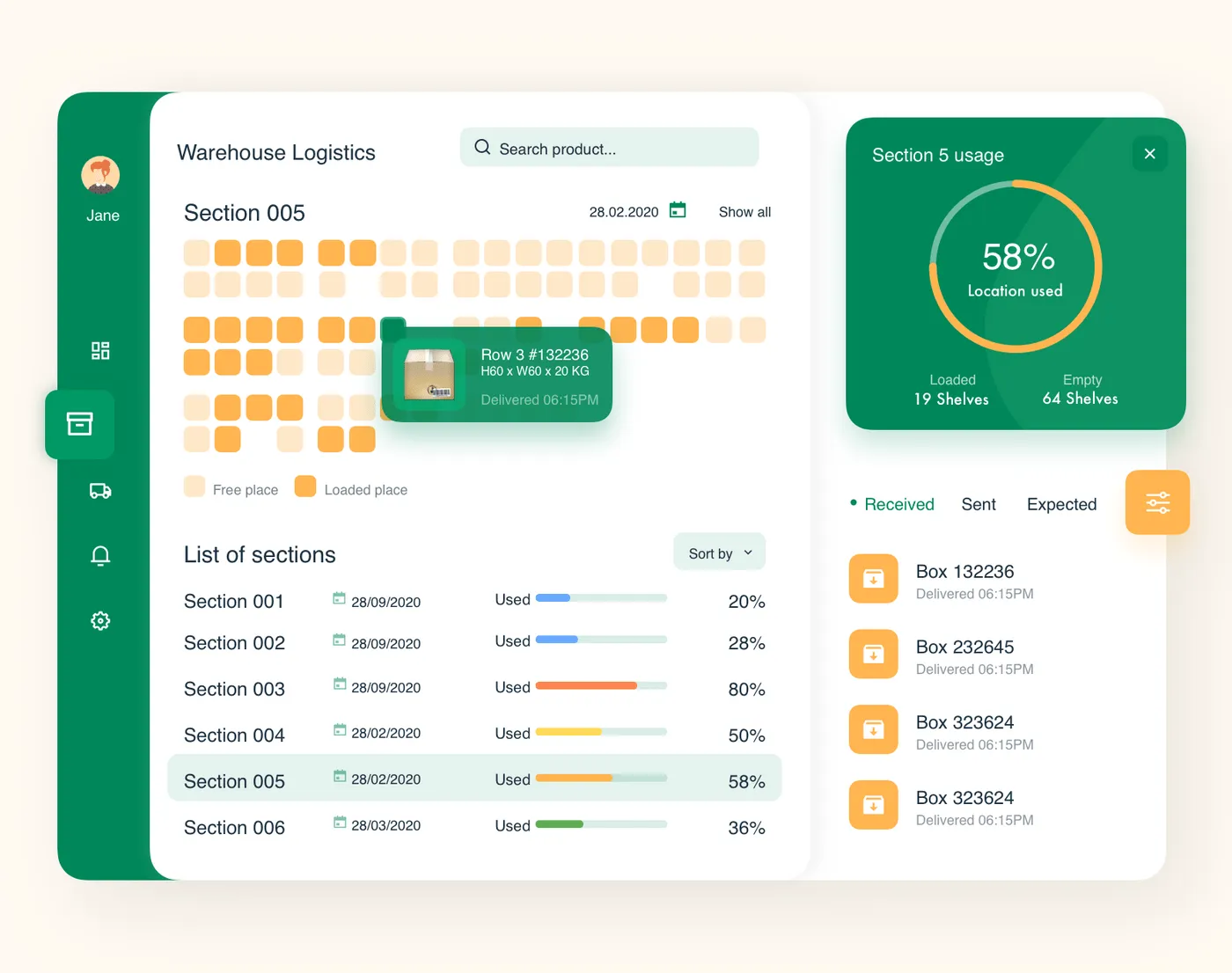
Warehouse management
Learn what wireframes are and why they are the key to the successful design
However, the layout isn’t the only thing that matters. Properly matched color schemes, fonts, buttons, and other minor details make the final version even more attractive and easy-to-use. So, when searching for a tech partner, make sure that they provide quality UI/UX design services.
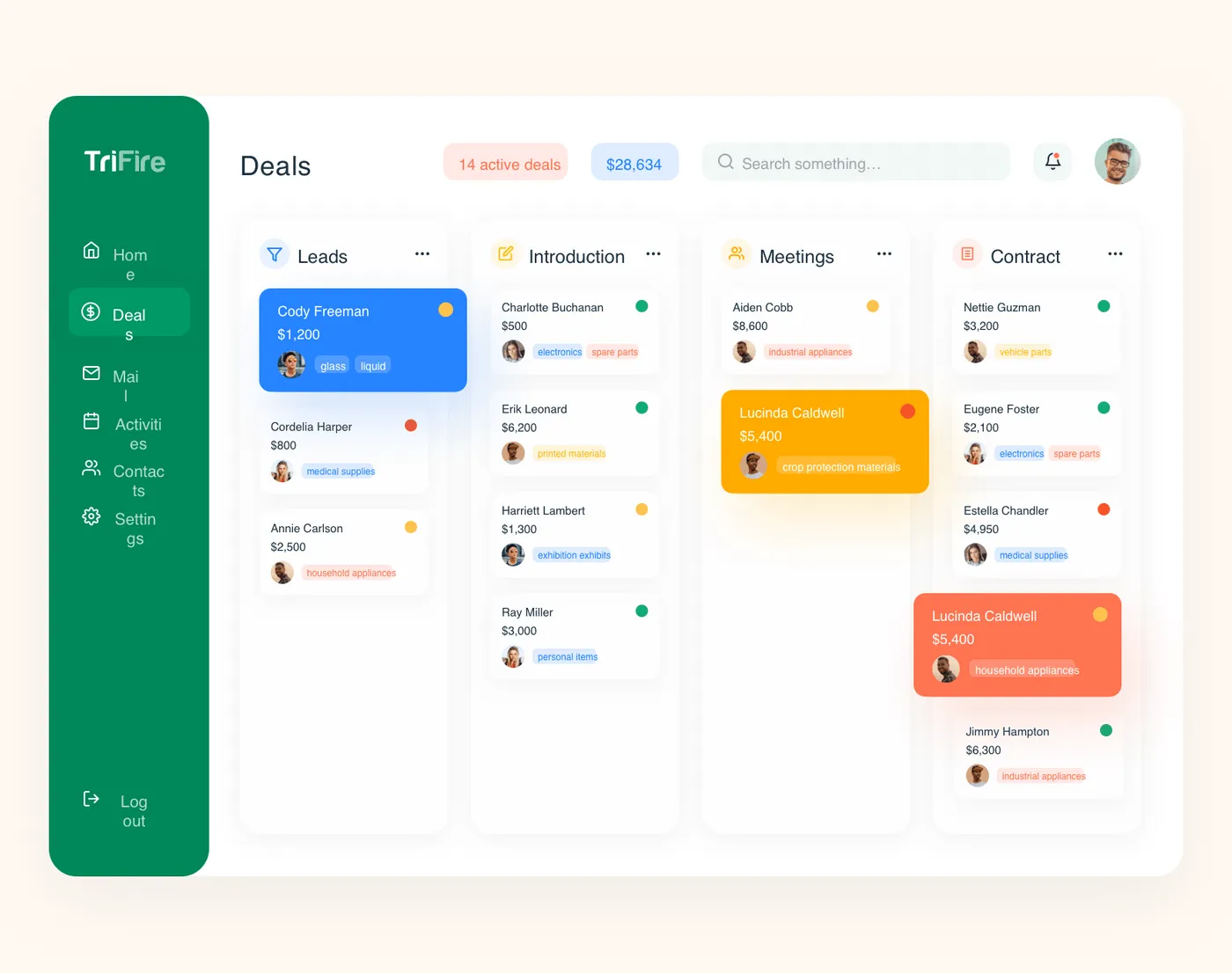
CRM system
Tech Stack
Apart from appearance, an ERP software development company should take care of the software filling. To implement the architecture, engineers use various technologies and development approaches. The tech stack they use depends on the chosen platforms. Thus, if the ERP system is focused on desktop platforms, developers will use C++/C# for Windows or Swift/Objective-C for macOS.
For a web-based project, the tech stack includes Angular, Bootstrap, JavaScript, Node.js, and a bunch of frameworks like jQuery. It’s hard to include all technologies to the list because the final stack depends on features and project requirements.
In the list below you can see the approximate set of technologies for ERP software development.
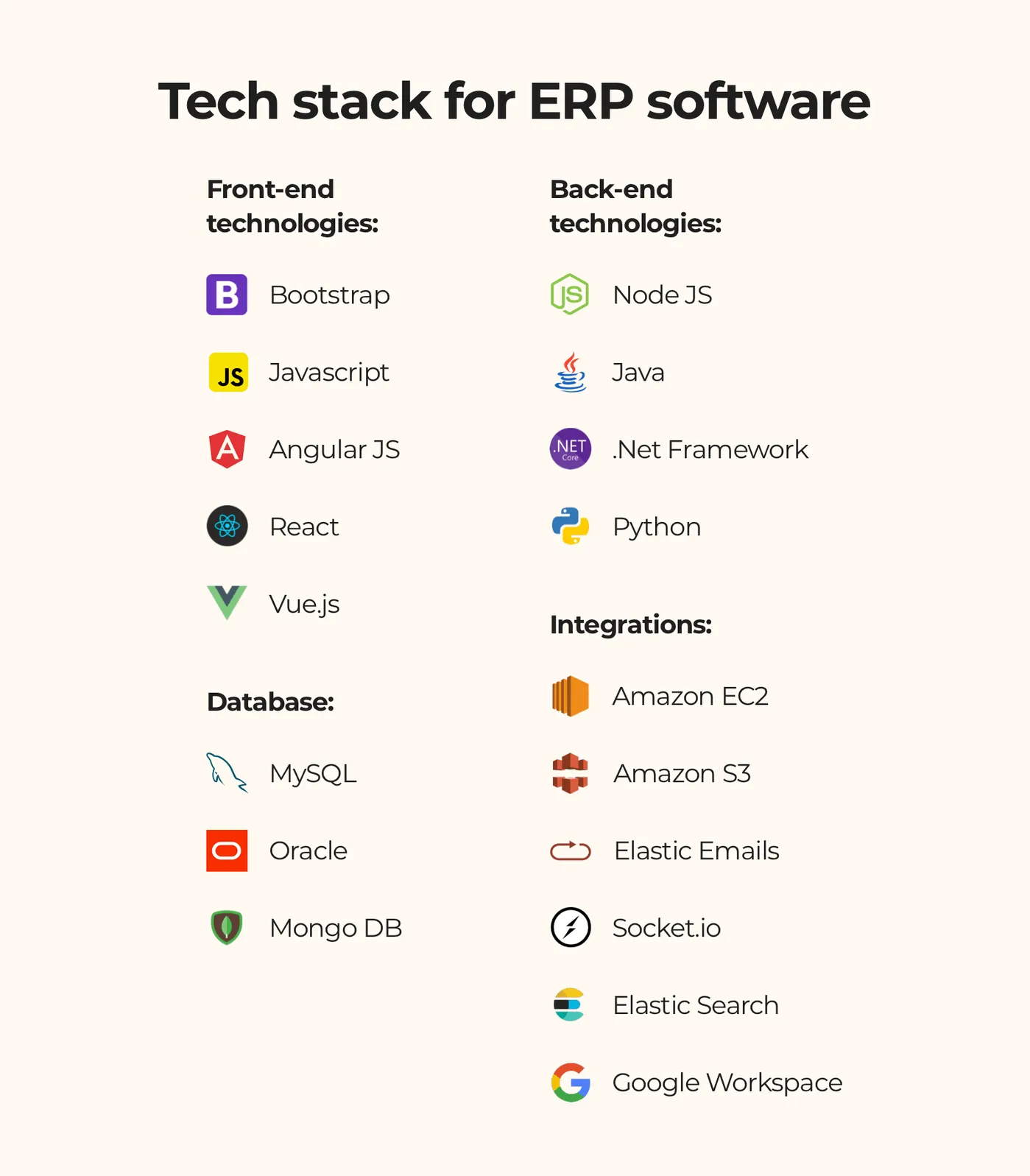
ERP software development technologies
Contact our business analysts for tech consultation and custom tech stack.
Integrations
During the workflow, companies often use various third-party products. Services like G Suite, Office 365, FreshBooks, and others should be combined with the ERP system. With the help of APIs provided by the third-party software, ERP software developers can access the information and display it in the ERP system. This provides more business-related information to your employees, so the ERP system becomes more versatile and multi-functional.
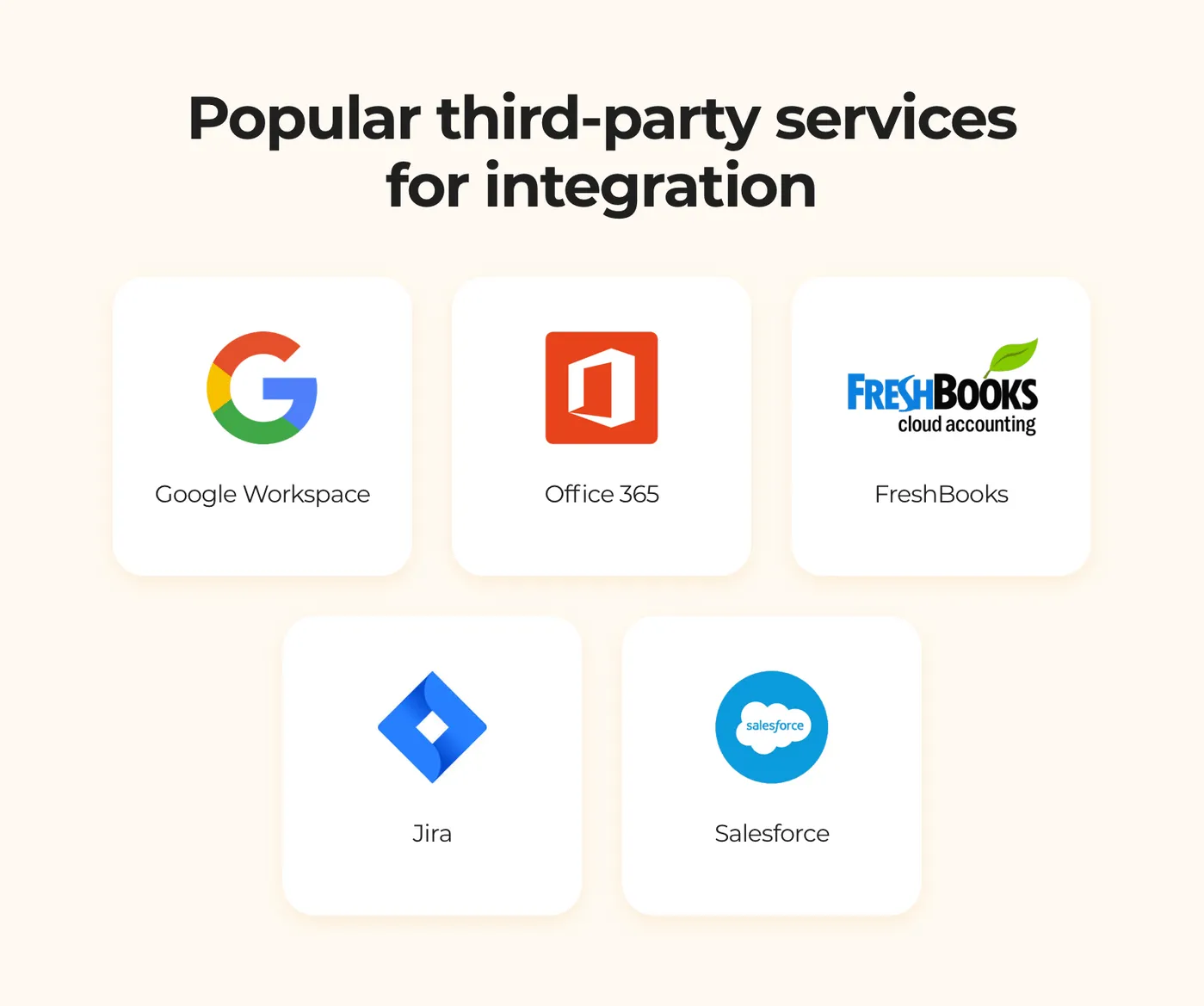
Third-party services for integration
Sometimes third-party integrations can replace large modules in ERP software development. For instance, CRM is a system that helps the sales department to track points of entry, lead quality, sales pipeline, and so on. For small and mid-sized companies, it may be too expensive to build this ERP module from scratch. Integration with third-party software lets companies save money and time on building the module and transferring all data from the previous database.
Quality Assurance
Testing such a tremendous system is a complicated process that requires experienced quality assurance engineers. Software testing has several stages that take place during different phases of ERP software development.
For example, engineers conduct unit testing to see how new features work with other software modules. On the other hand, system testing validates a final, integrated version of the product to check the compliance with initial requirements. These two testing types require separate blocks of time. And there are five different types of functional testing and five more types of non-functional testing. So, you can already understand that quality assurance takes the bulk of the ERP software development time.
We’ve explained all testing types and steps our engineers take to handle the quality assurance process.
Besides, QA engineers should be perfectly qualified to detect all bugs and vulnerabilities before the software is released. You should understand that ERP software development is responsible for vital processes in the company. So, we strongly recommend you choosing the software partner that provides software testing services.
The Cost of ERP Software Development
Finally, we’ve reached the section that concerns the majority of entrepreneurs. How much does the ERP software development cost? Before we dive into the topic, you should understand that the price depends on the number of features, the company's size, the number of roles in the system, and some other factors. So, it’s impossible to give a one-size-fits-all answer to this question.
First off, let’s take a look at what expenses you should be ready for building a custom ERP.
Price Formation
ERP software development cost is an intricate concept that includes various expenses. Some lines of expenses don’t even concern software development, but you still need to be aware of them. Here’s the list of the major price-influencing factors:
- Development and integration. First off, engineers need to build the software. The team consists of developers, designers, software testers, and project managers. ERP software development is the most expensive component on our list due to the software complexity. Besides, ERP systems require a lot of space and computing power, so you probably need to upgrade your hardware or cloud plan.
- Training. It’s always hard to adapt to a new workflow. Your employees need time to understand how the software works and how to use it in everyday practice. Right after the implementation, your departments will be slightly less effective than they were before. The reason is that employees need some time to get along with the system. As you understand, productivity losses will lead to increased expenses.
- Tuning up the company. Even though ERP systems automate a lot of routine tasks, they require these tasks to comply with particular standards. That’s why if your internal processes are outdated, you’ll have to adjust them for your ERP application. Obviously, it takes your managers’ time and increases the overall cost of ERP application development.
- Maintenance. The ERP system may be based on the local hardware or in the cloud. Hardware and network elements aren’t eternal. Some physical elements of the ERP system may fail, so you’ll have to purchase new ones. To prevent system failures, you need to hire a technician that inspects the network condition and performs replacements when needed. If you’ve chosen a cloud-based architecture, you’ll need to hire DevOps services to effectively adjust the system.
- Upgrades. Companies don't stand still. In terms of sustainable progress, the company’s workflow constantly changes. As you understand, any changes to the workflow influence the software. For instance, if you’ve created a new department, all core functionalities of new employees should be added to the software. Without regular updates, ERP software development becomes meaningless.
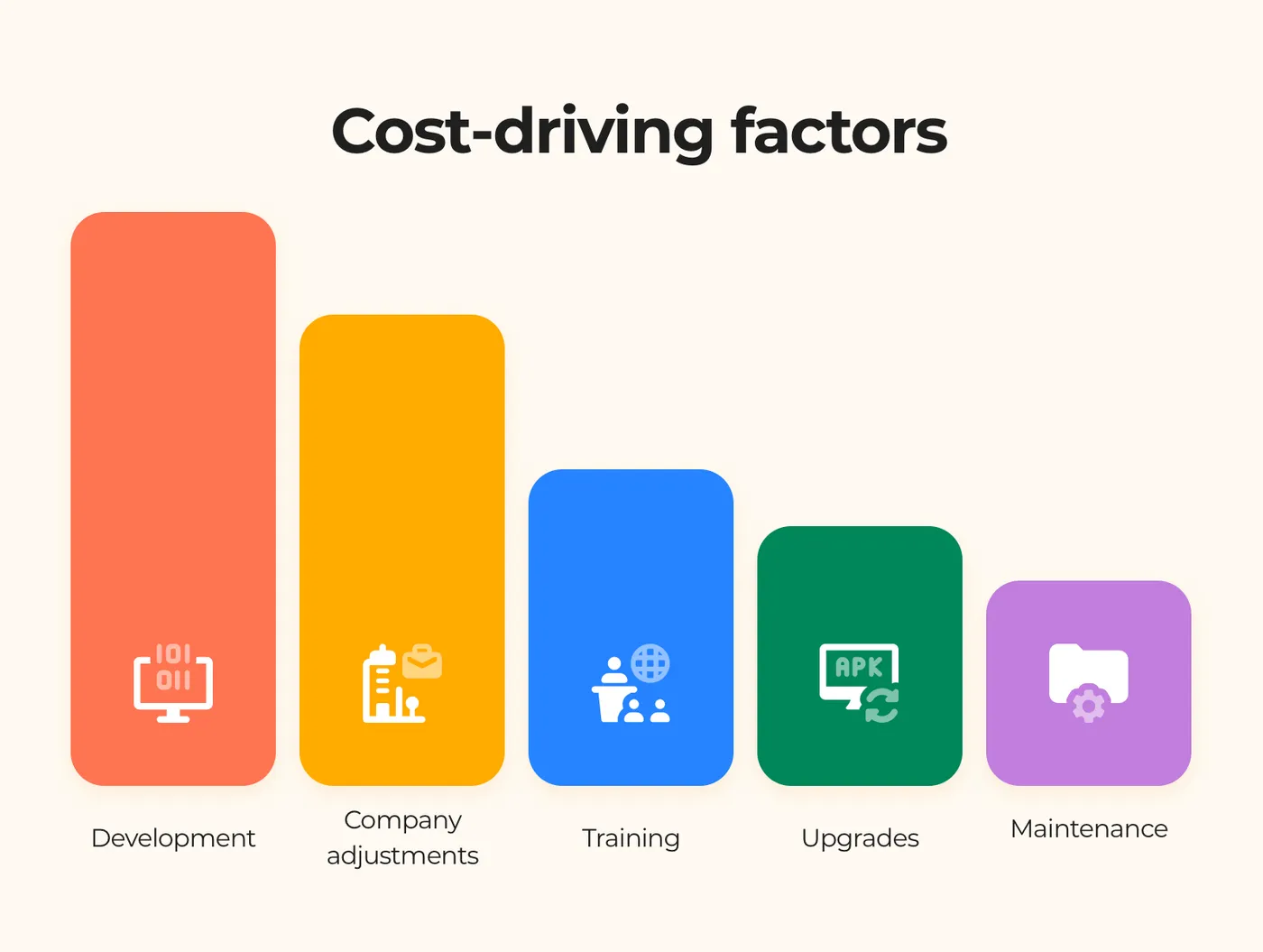
Factors influencing ERP software development cost
The final price depends on the number of modules you need, the number of employees in your company, and so on. ERP software development for large enterprises that covers more than 100 users may cost up to $500,000. Smaller solutions are significantly cheaper. Thus, the software for less than 10 users may cost you $50,000. The average price for a mid-sized company lies in the range of $100,000 to $250,000.
To get a personalized estimate based on your requirements, contact our business analysts.
How Can Cleveroad Help You?
Here, at Cleveroad, we know how to build SaaS products for large enterprises and young developing businesses. We’ve recently worked on RetailOps platform, a solution automating warehouse and supply chain processes. On top of that, we use our custom RPA software that helps accountants to generate documents automatically. Check out our portfolio to get more examples of our work.
Looking for ERP developers?
Get a consultation from our solution architect to learn how to solve your business problems.
ERP software development is a process of creating enterprise resource planning software. ERP software handles the management of main business processes in real-time. ERP applications collect, store, manage and interpret information from various business activities. In some sense, ERP software is a mediator between all core business processes.
Here are some of the ERP application development benefits:
- Easy-to-learn. It’s easier to explain something designed exclusively for your company than for a mass market.
- Easy-to-maintain. With custom software, your developers know all the system’s peculiarities and can fix bugs in no time.
- Flexibility. Your business is unique, and only a custom solution can solve all your problems. With ERP software development, the product is designed specifically for your company, so you don’t have to restructure it for a third-party application.
ERP software can help you automate a variety of routine tasks and manage your employees effectively. Besides, employees will get access to a range of useful features that will enhance productivity and let them focus on their primary tasks.
ERP software development agency can build the software in the shortest terms possible. An experienced EPR software development company has a team that consists of developers, testers, designers, project managers, and other members. The symbiosis of team players grants a quality software that complies with all regulations and has no vulnerabilities. However, to get a software that matches your needs you need to find a company that has a significant expertise in ERP software development.
Here's the list of ERP software development elements:
- Clarifying your idea
- Wireframing
- Drawing up a tech stack
- Software development
- UI/UX Design
- Quality assurance
It's hard to distinguish the most important modules in ERP systems because everything depends on the company type. For example, if you run a delivery-related business, the supply chain-module will be the most important in your case. On the other hand, if you deal with sales processes, a powerful CRM module will be your top priority.

Evgeniy Altynpara is a CTO and member of the Forbes Councils’ community of tech professionals. He is an expert in software development and technological entrepreneurship and has 10+years of experience in digital transformation consulting in Healthcare, FinTech, Supply Chain and Logistics
Give us your impressions about this article
Give us your impressions about this article
Comments
6 commentsAn Enterprise resource planning (ERP) software or system development helps organizations better manage their resources. ERPs connect every aspect of an enterprise. An ERP software system allows for better performance and project management that helps plan, budget, predict and accurately report on an organization's financial health and processes. Thanks for sharing this Informative article.
Thanks for this great post, very informative and helpful for readers of all backgrounds. ERP systems are very beneficial however some people may prefer to pay for one built for them than to build it themselves.
I'm an owner of a small retail network. We use ERP systems to control internal processes. We use third-party solution (don't want to disclose the vendor), but I'm planning on developing my own. Thanks
Astonishing content
Thanks for the efforts you put in your article. It would be interesting to know more about integrations of third-party software into custom ERP system. Keep on keeping on!
Great post! Thanks for your work